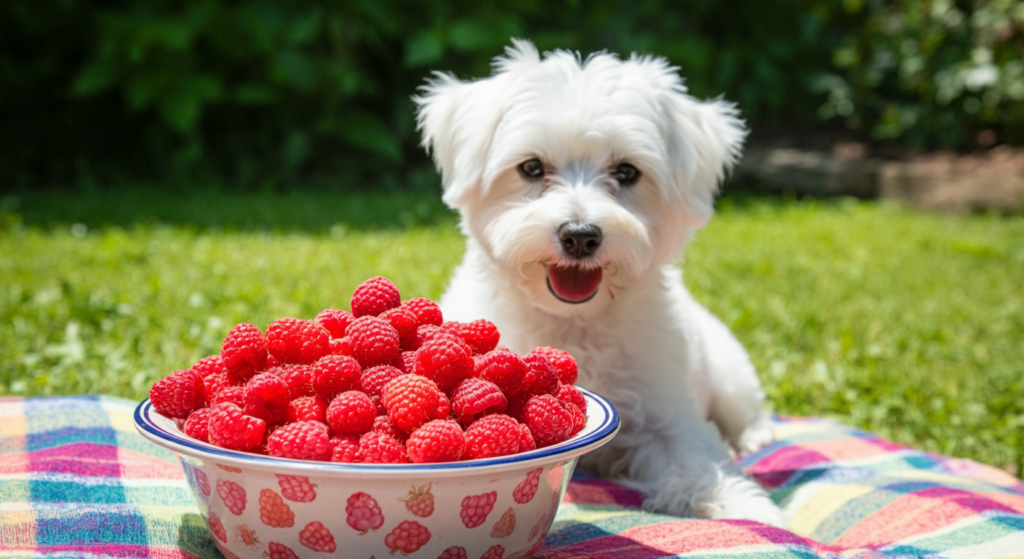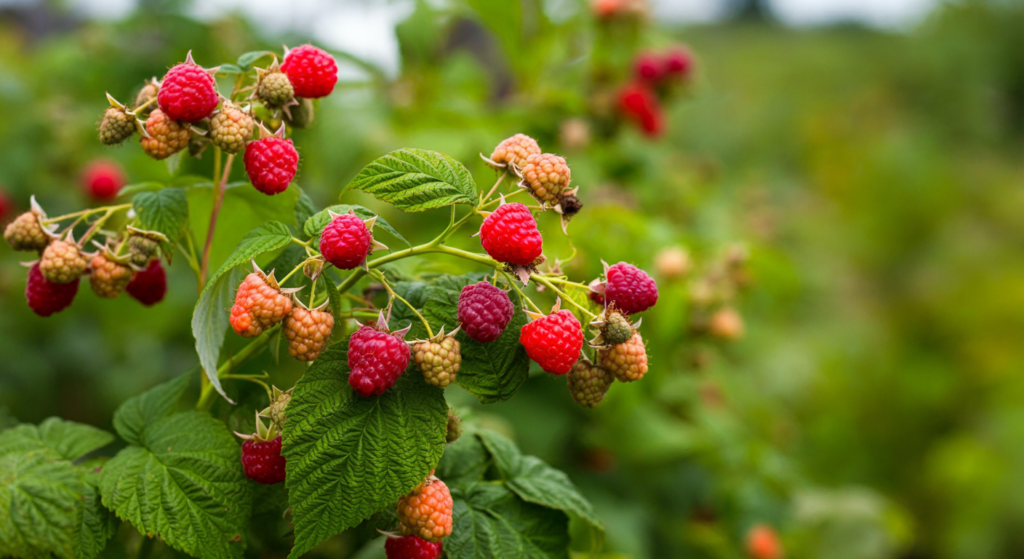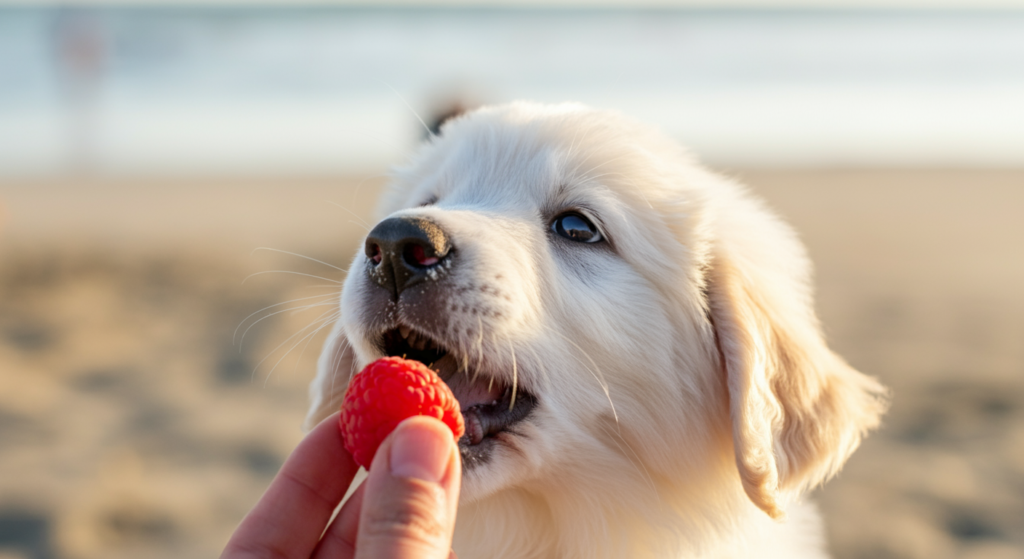Can dogs eat Raspberries?
Can dogs eat Raspberries? : Raspberries and Paws, Sweet Treat or Trouble?
As responsible dog owners, we’re naturally concerned about what foods are safe to share with our pets. With certain human foods being harmful to dogs, it’s important to evaluate each one carefully. Raspberries, a fruit widely enjoyed for their sweet and tangy flavour, often lead to questions like, “Are raspberries safe for dogs?” While they’re known to offer health benefits for people, it’s worth exploring whether they’re suitable for your canine companion. Understanding the details ensures you can make the best choices for your pet’s diet.
Yes, dogs can eat raspberries, but only under specific conditions. When served plain, fresh, and in moderation, raspberries are safe for dogs and may even provide some health benefits. However, certain aspects of raspberries, such as their natural sugar and xylitol content, require careful consideration. Let’s dive deeper to ensure you’re making the best choice for your dog’s health.
Table of Contents
- Can dogs eat Raspberries? : Raspberries and Paws, Sweet Treat or Trouble?
- What Are Raspberries?
- Can Dogs Eat Raspberries?
- What Are the Benefits of Raspberries for Dogs?
- Are Raspberries Bad for Dogs?
- What Are the Dangers of Dogs Eating Raspberries?
- How Many Raspberries Can Dogs Eat?
- Can Dogs Eat Other Raspberry Products?
- Key Tips:
- Final Thoughts:

What Are Raspberries?
Raspberries are small, sweet berries belonging to the rose family. Known for their vibrant red colour and tart flavour, they are a nutrient-rich fruit enjoyed worldwide. Raspberries contain essential vitamins, minerals, and antioxidants, making them a popular choice for health-conscious humans.
In human cuisine, raspberries are often eaten fresh, blended into smoothies, or used in desserts. While their natural sweetness makes them appealing, this sugar content and the trace amounts of natural xylitol they contain mean you should consider certain factors before sharing raspberries with your dog.
Can Dogs Eat Raspberries?
The simple answer is yes, dogs can eat raspberries, but only in moderation and under certain conditions. When served plain and fresh, raspberries can provide health benefits. They’re rich in antioxidants and dietary fibre, which may contribute to a healthy diet for your dog.
However, not all dogs will tolerate raspberries the same way. Factors such as your dog’s size, dietary needs, and tolerance for fruit should be considered before offering them this treat.
What Are the Benefits of Raspberries for Dogs?
Raspberries, when prepared correctly and offered in moderation, can provide certain benefits to your dog. While not essential to a dog’s diet, these berries contain nutrients that may support your pet’s overall health. Here are some potential benefits:
1. Rich in Antioxidants
Raspberries are packed with antioxidants, such as vitamin C and flavonoids. These compounds help fight free radicals in your dog’s body, reducing oxidative stress and supporting a healthy immune system. Antioxidants may also contribute to better skin and coat condition.
2. Supports Digestive Health
The dietary fibre in raspberries can help support healthy digestion. Fibre promotes regular bowel movements and may be beneficial for dogs prone to mild constipation.
3. Low in Calories
Raspberries are a low-calorie snack, making them a good option for dogs on a weight management plan. They provide a burst of flavour without contributing to excessive caloric intake.
4. Contains Essential Nutrients
Raspberries are a source of vitamins and minerals, such as:
- Vitamin C: Supports immune function and overall health.
- Manganese: Important for bone health and metabolism.
- Dietary Fibre: Aids in digestion and helps maintain a healthy gut.
5. Anti-Inflammatory Properties
Raspberries contain natural anti-inflammatory compounds, which may be beneficial for older dogs with arthritis or joint pain.
Are Raspberries Bad for Dogs?
In moderation, raspberries are not bad for dogs. However, excessive consumption can lead to digestive upset, such as diarrhoea or bloating. Additionally, raspberries naturally contain xylitol, a sugar substitute that is toxic to dogs in large quantities.

What Are the Dangers of Dogs Eating Raspberries?
While raspberries can offer some benefits, they also come with potential risks. Here are the key dangers associated with dogs eating raspberries:
1. Natural Xylitol Content
Raspberries contain trace amounts of xylitol, a substance highly toxic to dogs in large amounts. Although the xylitol content in raspberries is low, excessive consumption could pose a risk, particularly for small dogs.
Tip: Limit your dog’s raspberry intake to a safe amount based on their size.
2. Digestive Upset
Raspberries are high in fibre, which can cause digestive issues if eaten in excess. Symptoms may include:
- Diarrhoea
- Vomiting
- Gas or bloating
Tip: Introduce raspberries gradually to see how your dog’s stomach handles them.
3. Sugar Content
While the sugar in raspberries is natural, consuming too much sugar can contribute to:
- Weight gain
- Dental issues
- Potential spikes in blood sugar for diabetic dogs
Tip: Offer raspberries as an occasional treat, not a daily snack.
4. Allergic Reactions
Although rare, some dogs may be allergic to raspberries. Signs of an allergic reaction include:
- Itching or scratching
- Swelling of the face or paws
- Difficulty breathing
Tip: Monitor your dog after introducing raspberries and consult a veterinarian if any unusual symptoms appear.
How Many Raspberries Can Dogs Eat?
Portion control is key when feeding raspberries to dogs. A small dog may tolerate only a few berries, while larger breeds might enjoy up to a handful. As a general rule:
- Small dogs: 1–2 raspberries
- Medium dogs: 3–5 raspberries
- Large dogs: 6–7 raspberries

Can Dogs Eat Other Raspberry Products?
While fresh raspberries can be safe for dogs in moderation, raspberry-based products often come with added ingredients that may not be suitable for your canine companion. Here’s a breakdown of common raspberry products and their safety for dogs:
1. Raspberry Jams or Preserves
- Not recommended.
These products often contain added sugar, artificial sweeteners (like xylitol, which is highly toxic to dogs), and preservatives that can harm your dog’s health. Avoid feeding jams or preserves to your dog.
2. Raspberry Yoghurts or Smoothies
- Use caution.
Some plain yoghurts with no added sugar or artificial sweeteners may be safe in small amounts. However, flavoured yoghurts or smoothies often include high sugar content, artificial ingredients, or xylitol, making them unsuitable for dogs. Always check the ingredient list carefully.
3. Raspberry-Flavoured Candies or Desserts
- Unsafe.
Candies, cakes, or desserts with raspberry flavouring are usually loaded with sugar, artificial colours, and other additives that are harmful to dogs. They may also contain chocolate or xylitol, which are toxic to dogs.
4. Raspberry Juices
- Not ideal.
Commercial raspberry juices are typically high in sugar and may contain artificial sweeteners or additives. Even natural juices may upset your dog’s stomach due to concentrated fruit sugars.
5. Dried Raspberries
- Use caution.
Dried raspberries can be higher in sugar content than fresh ones, which may not be ideal for dogs, especially if consumed in large quantities. Stick to fresh raspberries as the safer option.
Key Tips:
- Always check the ingredient list for harmful additives, especially xylitol.
- Avoid processed raspberry products that contain sugar, sweeteners, or artificial ingredients.
- Stick to fresh raspberries for the safest option.
If you’re unsure about a specific raspberry product, it’s best to consult your veterinarian before sharing it with your dog.
Final Thoughts:
So, can dogs eat raspberries? The answer is yes—with precautions. Always serve fresh, plain, and unprocessed raspberries in moderation. Avoid canned or sweetened varieties, and monitor your dog for any adverse reactions. While raspberries are not a dietary necessity for dogs, they can be a tasty and nutritious treat when offered responsibly.
Have you tried giving your dog raspberries? Share your experience below!
